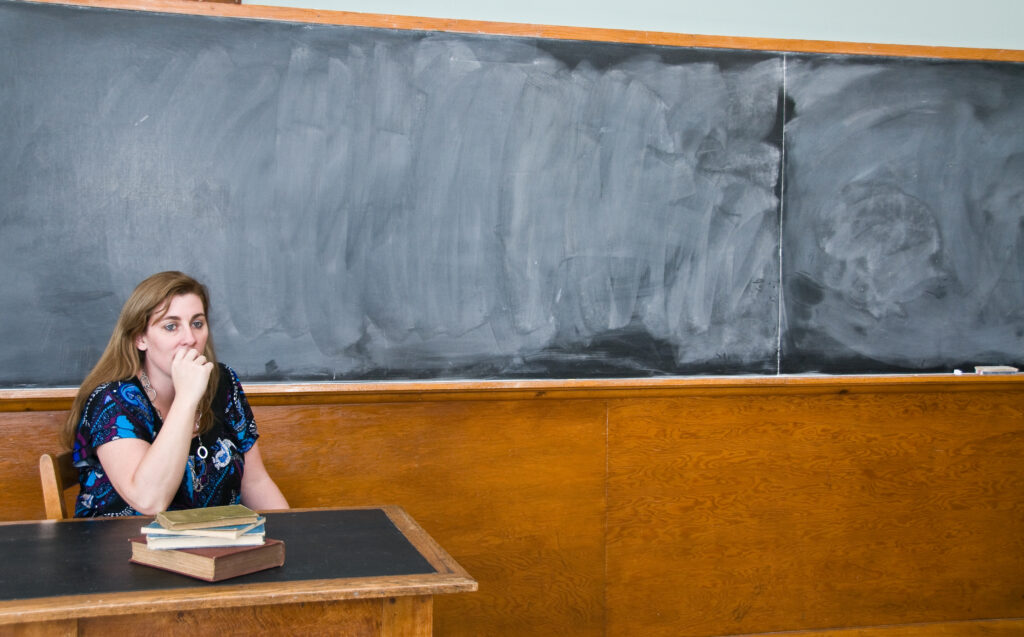

Features
Mental Health
Addressing mental health of teachers following aggressive student encounters
By Mia Barnes
 Photo: Getty Images
Photo: Getty Images Student aggression toward teachers continues to be a concern throughout Canada, but what can you do to help? Teachers should feel supported following the experience. Here is why it is essential to address teachers’ mental health after an aggressive student encounter.
The importance of teacher mental health
Teachers exhibit one of the highest levels of burnout. Teaching and caring for students is a lot to handle, and support is essential to helping them stay passionate about the vital work they perform. No teacher should feel ashamed about needing to seek help for their mental health, and they should always feel like they can be open about their feelings.
Aggressive student Eencounters
Students are known to test boundaries, but occasionally, dysregulated emotions, lack of discipline and raging hormones cause unacceptable aggression toward teachers. Between 2021 and 2022, for example, there were more than 14,000 reports of student violence across Canada.
In a survey of students in Alberta, British Columbia and Ontario, more than one-third of students think violence at school is worse than before, and around the same number think it isn’t decreasing. These encounters can range from yelling and shoving to beatings and stabbings. Witnessing or becoming a victim in these interactions can have a severe impact on teachers’ mental health.
Mental health conditions that occur from violent experiences
Aggressive student encounters can have a significant impact on teachers’ mental health. Being in these situations might result in experiencing the following common mental health conditions.
Anxiety
A 2022 survey found that most teachers are in the 80th percentile around stress, and increased stress levels can contribute to anxiety disorders.
From worrying about other students to fearing something could happen to them again, it’s hard to feel safe after an aggressive encounter. If the student returns to school, the teacher could fear retaliation for any punishment. People who have anxiety are in a constant state of fight or flight, causing racing, irrational thoughts and physical symptoms.
Depression
Aggressive student encounters can also contribute to depression. Teachers are tasked with maintaining control in their classrooms, but dealing with an aggressive student can make them feel vulnerable. Like all professions, teaching has both wonderful and awful moments. When the terrible times outweigh the good, it causes or amplifies depression symptoms, which can increase the risk of burnout and have dangerous consequences.
Post-Traumatic Stress Disorder (PTSD)
Some incidents of student aggression are severe enough to cause post-traumatic stress disorder (PTSD) in teachers. The event can lead to insomnia, flashbacks and other life-altering symptoms that can make it incredibly difficult to return to where it happened. This can contribute to the quarter of Canadian teachers leaving their positions due to poor mental health.
Addressing teacher mental health
School officials must support teachers after aggressive student encounters. Teachers shouldn’t sacrifice caring for their minds to care for their pupils’ minds. The following can help.
Encourage open communication
Mental health care is still a stigmatized topic across the globe. Communication is key to breaking the barriers of conversation. Encourage teachers to be honest about their mental state without fear of repercussions.
Everyone needs support, and modelling positive mental health conversations is one way to help teachers feel less alone. You don’t have to cross boundaries, but you can share if you have a hard time. Showing empathy to teachers after aggressive student encounters can assure them they’re in a safe environment.
Provide information about leave/self-care
While Canadians can use their sick leave for any health-related purpose, some workers feel uncertain about using sick leave for mental health. Teachers may feel guilty for leaving their students and fear damage to their reputations. You can help by reminding teachers to care for their mental health and encourage them to use their leave if needed.
Consider gifting your teachers with gift cards to a spa, nice restaurant or entertainment experience after an aggressive student encounter. You can encourage them to use it on their day off. This is also another opportunity to lead by example. If you’re comfortable, let your teachers know when you are taking time off to care for your mental health.
Offer training
Teachers have many meetings and training throughout the year. What’s one more if it could change their life? Consult with local mental health professionals to develop training for how teachers can best handle aggressive student encounters. The training should cover the steps to take at the moment and ways to cope mentally. Meditation and breathing techniques can help reduce anxiety, as can talking through the scenario with a trusted colleague or mental health professional.
Provide resources
A teacher might know they need mental health care but might not know how to get it. Luckily, there are more than 19,000 psychologists nationwide specializing in different areas of concern.
Research professionals in the area who could be a great fit, and make the list available to your teachers and staff. Work with teachers to rearrange their schedules if their appointments are midday. Provide a quiet space for any virtual consultations. An aggressive student encounter can be traumatizing, and offering these resources helps validate the experience.
Aggressive student encounters can be traumatic, and addressing teachers’ mental health can help them move forward, decreasing the risk of them leaving the career they love.
Mia Barnes is the editor-in-chief at Body+Mind.
Print this page